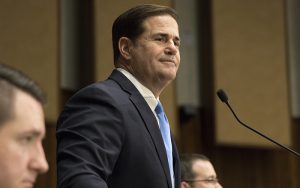- Slug: BC-CNS-Opioids doctor training, 600 words
- Photo below
- Video here
By Courtney Columbus
Cronkite News
PHOENIX – Medical professionals say Gov. Doug Ducey’s letter urging that Arizona doctors receive more education on drug addiction is a step forward in the battle against opioid abuse, but that the curriculum must be detailed and useful.
Ducey said on Monday that he had sent a letter to the Arizona Medical Board and Arizona Board of Osteopathic Examiners recommending that the boards require doctors to complete one hour of education on addiction or opioid prescribing as part of the 40 continuing education hours that physicians must complete every two years.
Medical professionals and an Arizona physician-legislator see the recommendation as a helpful step forward. In 2015, 401 people in Arizona died from prescription opioid overdoses, according to the governor’s office.
Christina Corieri, the governor’s senior policy adviser, said Ducey “has been strongly focused on opioids since he took office,” and Monday’s letters fit with other steps he has taken to fight the opioid epidemic in Arizona. Ducey issued an executive order in October to limit the first fill of opioid prescriptions to seven days for Arizonans who have insurance through the state’s Medicaid program, for state employees, and for minors, with a few exceptions for people who have cancer and other illnesses.
Corieri said the governor plans to meet with the state’s medical board soon to follow up on his recommendation.
“We felt it’s incredibly important that doctors not only are aware of this trend, but are able to have all of the information they need to be able to properly prescribe,” Corieri said.
Dr. Andrew Kolodny, executive director of Physicians for Responsible Opioid Prescribing, said Ducey’s letter shows an improvement in how policymakers view the problem of opioid addiction. Kolodny also directs the Opioid Policy Research Collaborative at Brandeis University
“What we’re dealing with is an addiction epidemic caused by overprescribing of opioids,” he said. “People who are addicted aren’t doing this because they’re having fun. Once you’re addicted, you have to keep doing this to avoid feeling awful.”
Though providing more opioid prescribing education for doctors could benefit patients, it should not be seen as an instant solution, he said.
“The devil is in the curriculum. If you make your prescribers take education and the education is lousy, it will have no effect and, in fact, if the education makes opioids sound better than they are, it could worsen the problem,” Kolodny said.
The Arizona Medical Board will discuss Ducey’s recommendation this week, said executive director Patricia McSorley.
Jenna Jones, executive director of the Board of Osteopathic Examiners, said she may see some pushback from medical professionals who don’t prescribe opioids and may feel the governor’s recommendation doesn’t apply to them. She said the board recognized the problem of doctors overprescribing opioids a few years ago and has been making educational materials available since 2014.
Dr. Janice Johnston, the medical director of Redirect Health, also commended Ducey’s letter. She doesn’t think the requirement of one hour of opioid prescription education would be burdensome for doctors.
“I think that by doing this, he is showing incredible leadership for our state,” she said.
Johnston said providing more education for physicians is one aspect of the fight against opioids, but it’s also important to ensure that patients understand the pros and cons of taking opioids before a doctor prescribes them. She refers to these drugs as “heroin derivatives” to help patients understand the risks involved.
State Rep. Randy Friese, who is also a doctor, said he’d be interested in speaking with Ducey about his plan. Solving the opioid epidemic would take a “multifaceted solution,” the Tucson Democrat said.
“Each facet is going to come over time, we’re not going to have the solution in one bill, in one piece of legislation,” Friese said.
“Making providers more aware of the problem is a good thing,” Friese said.
Friese and Kolodny both said they thought opioid prescribing education should go beyond Ducey’s one-hour recommendation.
